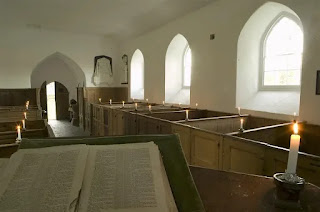Contours of Conformity 1662-1832: Praying for the Reformed Churches Abroad "as so many Churches of Christ"
In demonstrating this care for the 'Reformed Churches abroad', I pointed to the official prayers issued in 1694 and 1759 for "the Reformed Churches", "especially for the Reformed Churches". These two examples, however, are merely a part of a consistent practice - over decades - of official prayers offered in solidarity with and support for these churches.
These prayers occurred in 'Forms of Prayer and Thanksgiving to Almighty God', issued by authority, usually related to victories won by forces of the Crown in the various European conflicts of these decades. It is in this context that prayers for the 'Reformed Churches abroad' were offered, threatened as they were by various Catholic powers. In 1692, the 'Form of Prayer and Thanksgiving' included two petitions for the Reformed Churches. These collects were for use after the Prayer for the Church Militant in the Ante-Communion. The first asked for "the comfort and support of the Reformed Churches abroad", while the second - 'A Prayer for all Mankind, especially for the Reformed Churches' - recognised the fraught circumstances of these churches in the face of the ambitions of Louis XIV during the Nine Years' War:
We humbly beseech thee to extend thy Mercy and Compassion to all Mankind; more particularly to the Reformed Churches abroad; and especially to those who are still under Persecution for Truth and Righteousness sake. Relieve them according to their several necessities; be a shelter and defence to them from the fury of the Oppressour.
This second prayer, "especially for the Reformed Churches", in the face of the military might of the Catholic powers, was also to be found in the 'Forms of Prayer and Thanksgiving' issued in 1695, 1696. In 1697, retaining the same title, the petition was altered to become more general for these Churches, in recognition of the "Happy and Honourable Peace" secured by the Treaty of Ryswick, bringing an end to the Nine Year's War:
more particularly to the Reformed Churches abroad, giving them all blessings convenient for them.
In 1702, 'A Prayer for all Mankind, especially for the Reformed Churches' was replaced with 'A Prayer for all the Reformed Churches', to be offered at the conclusion of the Litany, and which again included an explicit recognition of the difficult political and military context faced by the Reformed Churches during the War of the Spanish Succession:
O God the Father of mercies, who of thy great goodness hast united us into thy holy Church, the mystical body of Christ; we as living members thereof, mourning with them that mourn, and rejoycing with them that rejoyce, do now present our Supplications and Prayers at the throne of Grace, in behalf of all the Reformed Churches; beseeching thee to look down in especial manner, with an eye of mercy and pity, upon the sad and mournful estate of such of them, whom thou haft delivered over to the hands of superstitious and merciless men.
1704 saw a reversion to 'A Prayer for all Mankind, especially for the Reformed Churches', after the Prayer for the Church Militant, continuing in 1705, 1706, 1707, 1709, and 1714 (the final year of the War of the Spanish Succession):
A Prayer for all Mankind, especially for the Reformed Churches.
O God, the Creator and Governor of the World, whose Mercies are over all thy Works: We beseech thee to extend thy compassion and favour to all Mankind ; more especially to the Reformed Churches, giving them all Blessings convenient for them.
Little wonder that a contemporary noted in 1714, "we have constantly had one or two collects for the Reformed Churches abroad, or beyond the Seas", seeing in this clear evidence that the radical High Church stance on 'Lay Baptism' controversy - that valid Baptism had to be administered by an episcopally-ordained minister - was incompatible with these prayers recognising the Reformed Churches abroad:
to return to the Church of England, tis plain, she has been inspir'd with more noble Sentiments, in that the obliges all her Sons to pray for the foreign Protestants, as so many Churches of Christ, which necessarily supposes them to be baptized Christians.
That this prayer would again be used at the conclusion of the War of the Austrian Succession (1740-48) - in 'A Form of Prayer and Thanksgiving' issued in 1749 - and that a similar prayer for "more especially in Behalf of all our Reformed Brethren" was issued during the Seven Years' War (1756-63), emphasises how a concern for and solidarity with the Reformed Churches abroad was a consistent and enduring practice in the Church of England during the 18th century, and certainly one of the contours of Conformity during this period.
We might also suggest that this practice has a continued relevance for Anglicans. The concern for and solidarity with the non-episcopal continental Reformed Churches seen in 18th century Anglicanism finds contemporary expression in, for example, the Reuilly Agreement (2001) between the Anglican Churches of these Islands and the French Reformed and Lutheran Churches. The Agreement affirms the apostolicity and catholicity of the French Reformed and Lutheran Churches, and recognises that the ordained ministry in those churches is "given by God as instruments of grace for the mission and unity of the Church and for the proclamation of the word and the celebration of the sacraments". It is, in other words, a significant contemporary expression of what was a significant contour of Conformity, 1662-1832.




Comments
Post a Comment